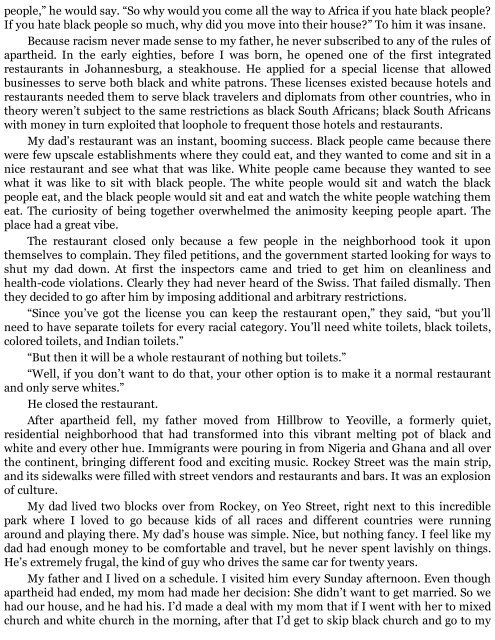Create successful ePaper yourself
Turn your PDF publications into a flip-book with our unique Google optimized e-Paper software.
people,” he would say. “So why would you come all the way to Africa if you hate black people?<br />
If you hate black people so much, why did you move into their house?” To him it was insane.<br />
Because racism never made sense to my father, he never subscribed to any of the rules of<br />
apartheid. In the early eighties, before I was born, he opened one of the first integrated<br />
restaurants in Johannesburg, a steakhouse. He applied for a special license that allowed<br />
businesses to serve both black and white patrons. These licenses existed because hotels and<br />
restaurants needed them to serve black travelers and diplomats from other countries, who in<br />
theory weren’t subject to the same restrictions as black South Africans; black South Africans<br />
with money in turn exploited that loophole to frequent those hotels and restaurants.<br />
My dad’s restaurant was an instant, booming success. Black people came because there<br />
were few upscale establishments where they could eat, and they wanted to come and sit in a<br />
nice restaurant and see what that was like. White people came because they wanted to see<br />
what it was like to sit with black people. The white people would sit and watch the black<br />
people eat, and the black people would sit and eat and watch the white people watching them<br />
eat. The curiosity of being together overwhelmed the animosity keeping people apart. The<br />
place had a great vibe.<br />
The restaurant closed only because a few people in the neighborhood took it upon<br />
themselves to complain. They filed petitions, and the government started looking for ways to<br />
shut my dad down. At first the inspectors came and tried to get him on cleanliness and<br />
health-code violations. Clearly they had never heard of the Swiss. That failed dismally. Then<br />
they decided to go after him by imposing additional and arbitrary restrictions.<br />
“Since you’ve got the license you can keep the restaurant open,” they said, “but you’ll<br />
need to have separate toilets for every racial category. You’ll need white toilets, black toilets,<br />
colored toilets, and Indian toilets.”<br />
“But then it will be a whole restaurant of nothing but toilets.”<br />
“Well, if you don’t want to do that, your other option is to make it a normal restaurant<br />
and only serve whites.”<br />
He closed the restaurant.<br />
After apartheid fell, my father moved from Hillbrow to Yeoville, a formerly quiet,<br />
residential neighborhood that had transformed into this vibrant melting pot of black and<br />
white and every other hue. Immigrants were pouring in from Nigeria and Ghana and all over<br />
the continent, bringing different food and exciting music. Rockey Street was the main strip,<br />
and its sidewalks were filled with street vendors and restaurants and bars. It was an explosion<br />
of culture.<br />
My dad lived two blocks over from Rockey, on Yeo Street, right next to this incredible<br />
park where I loved to go because kids of all races and different countries were running<br />
around and playing there. My dad’s house was simple. Nice, but nothing fancy. I feel like my<br />
dad had enough money to be comfortable and travel, but he never spent lavishly on things.<br />
He’s extremely frugal, the kind of guy who drives the same car for twenty years.<br />
My father and I lived on a schedule. I visited him every Sunday afternoon. Even though<br />
apartheid had ended, my mom had made her decision: She didn’t want to get married. So we<br />
had our house, and he had his. I’d made a deal with my mom that if I went with her to mixed<br />
church and white church in the morning, after that I’d get to skip black church and go to my
















